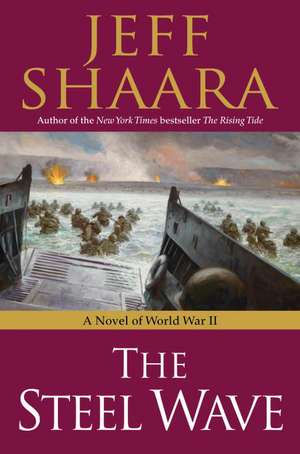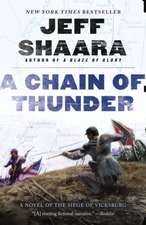The Steel Wave: A Novel of World War II: World War II
Autor Jeff Shaaraen Limba Engleză Hardback – 30 apr 2008
General Dwight Eisenhower once again commands a diverse army that must find its single purpose in the destruction of Hitler’s European fortress. His primary subordinates, Omar Bradley and Bernard Montgomery, must prove that this unique blend of Allied armies can successfully confront the might of Adolf Hitler’s forces, who have already conquered Western Europe. On the coast of France, German commander Erwin Rommel fortifies and prepares for the coming invasion, acutely aware that he must bring all his skills to bear on a fight his side must win. But Rommel’s greatest challenge is to strike the Allies on his front, while struggling behind the lines with the growing insanity of Adolf Hitler, who thwarts the strategies Rommel knows will succeed.
Meanwhile, Sergeant Jesse Adams, a no-nonsense veteran of the 82nd Airborne, parachutes with his men behind German lines into a chaotic and desperate struggle. And as the invasion force surges toward the beaches of Normandy, Private Tom Thorne of the 29th Infantry Division faces the horrifying prospects of fighting his way ashore on a stretch of coast more heavily defended than the Allied commanders anticipate–Omaha Beach.
From G.I. to general, this story carries the reader through the war’s most crucial juncture, the invasion that altered the flow of the war, and, ultimately, changed history.
Din seria World War II
-
 Preț: 80.93 lei
Preț: 80.93 lei -
 Preț: 80.93 lei
Preț: 80.93 lei -
 Preț: 78.89 lei
Preț: 78.89 lei -
 Preț: 78.98 lei
Preț: 78.98 lei -
 Preț: 79.07 lei
Preț: 79.07 lei -
 Preț: 80.77 lei
Preț: 80.77 lei -
 Preț: 72.51 lei
Preț: 72.51 lei -
 Preț: 78.98 lei
Preț: 78.98 lei -
 Preț: 61.85 lei
Preț: 61.85 lei -
 Preț: 60.25 lei
Preț: 60.25 lei - 13%
 Preț: 130.44 lei
Preț: 130.44 lei
Preț: 139.18 lei
Preț vechi: 173.07 lei
-20% Nou
Puncte Express: 209
Preț estimativ în valută:
26.63€ • 27.88$ • 22.17£
26.63€ • 27.88$ • 22.17£
Disponibilitate incertă
Doresc să fiu notificat când acest titlu va fi disponibil:
Se trimite...
Preluare comenzi: 021 569.72.76
Specificații
ISBN-13: 9780345461421
ISBN-10: 0345461428
Pagini: 493
Dimensiuni: 166 x 236 x 38 mm
Greutate: 0.85 kg
Editura: BALLANTINE BOOKS
Seria World War II
ISBN-10: 0345461428
Pagini: 493
Dimensiuni: 166 x 236 x 38 mm
Greutate: 0.85 kg
Editura: BALLANTINE BOOKS
Seria World War II
Extras
1. THE COMMANDO
At Sea, Bay of the Seine January 25, 1944
The air underwater was foul and wet, five men pulling against the thinning oxygen. He sat erect, his back painfully pressed against a coil of wire, part of the electrical system of the craft. She was an X-5 class midget submarine, designed to deliver a magnetic mine or similar explosive device, something to be attached to the bottom of an enemy ship. They were stealthy, of course, no blip on anyone’s radar screen, so the British navy had used them on raids all along the coastline, from Norway to the Mediterranean, usually with enormous risk to both the subs and their small crews. But tonight the sub was not armed, and where explosives had once been stored she now carried three passengers and their equipment.
He tried to stretch his back—no room—and twisted his shoulders instead, working out the kinks. The air was growing worse, thin and acrid, bitter smells of oil and wet cloth. There were no dry places in the small sub, every surface had a slick coating of oily grease or water, mostly condensation. The engine made a low hum, deadened by the steel of the bulkhead, the sub lurching slowly from side to side, held now by long low waves that rolled silently toward the beaches.
“Suit up, lads.”
The voice was low, a croak from the lieutenant. He knew the order was coming, yanked hard at his small duffel bag, and retrieved it from the tight gap beneath his feet. Inside were all the tools he would need for the mission. The first priority was unrolling the tight spool of the rubber suit, a single piece, zipped open down the front. There was little room to stand, and he fought to slide the thin rubber over his legs, working his feet downward, pushing. He slid the suit beneath his bottom, pushed his arms into the narrow sleeves, freed his fingers, gave one loud grunt, and pulled the suit up over his shoulders. The others were grunting as he was, straining in the tight space, backs and arms bent low, each man forcing himself into his taut suit. He tried to relax, leaning back against the bulkhead, and took a breath, sour air filling his mouth, took another, felt his chest heave in a futile gasp. He was sweating, worse inside the suit, and the air was growing fouler still. No matter how the air cleaners strained, they were not designed to handle the nervous breathing of five men.
He leaned forward again, pulled the zipper tight against his neck, then tugged at the headpiece, sliding it over his ears, snug, only his face revealed. He reached again into the bag, found a small tube of grease, black and oily, squeezed a thick stream onto his fingers, and rubbed it on his face, coating any part that would reflect moonlight. The duffel was nearly empty now, but he found his knife, his only weapon, and strapped it to his leg, tight and secure, then went into the bag again for a small bundle, a cloth pouch attached to a thin belt, and slid it around his waist. The man beside him gave him a nudge with his elbow.
“All set here. You all right, Dundee?”
“Yep. You tight in? Ready?”
The man slapped his hands on Dundee’s leg. “Ready as I’ll ever be.”
Dundee leaned forward, looked past, and said to the third man, “Lieutenant? You set, then?”
The lieutenant scanned both men. Dundee could see his face sweating, a dull wet mask, lit by the yellow glow from the sub’s instrument panel. Then the officer began to smear his face with the black grease.
“Don’t concern yourselves with me. My job is to worry about you. And right now I’m ready to get this little show moving.”
From the main control seat, the sub’s commander turned around toward them.
“We’ll be on the surface in half a minute. On my command, Mr. Higgins will open the hatch, and out you go. Make it quick. I’ll not chance there’s some Jerry lookout who’s good at his job. This tub won’t take pleasantly to incoming fire, and the sooner I can drop us out of sight, the better I like it.” He looked at his watch. “Orders say two hours. I’ll wait for three if I have to, but that’s it. I’m not about to sit out here and wait for the damned sun to come up. Sitting ducks, all of us. You got that?”
The lieutenant pointed at his own watch. “I know my orders, Cap- tain. We’ll be back in two hours. Don’t go off sightseeing. You’ve got a periscope—keep an eye in it. I don’t plan to tread water any more than I have to.”
“I know my tub, Lieutenant. And we’re lucky tonight. The surface is pretty smooth right now. A dicky bird swims within a hundred yards of me, I’ll spot her. You just do the swimming; I’ll see you.”
Swimming. Dundee swallowed the word silently. Most of the commando operations were launched from surface crafts, LCNs, small and rugged navigation boats. The LCNs slipped in close to shore, depositing their commandos in folbots, folding canvas boats, flimsy canoes the men would paddle hard to the beach. But there was too much tide and too much current along this stretch of the French coastline, and a folbot might swamp and drown the men before they could even reach the shore. It was a painful lesson; several men had been lost already in earlier operations. Besides being a danger to her crew, a folbot had to be hidden from German patrols, patrols that were growing vigilant. And so, tonight, they would swim.
The captain turned toward his instruments and pulled a lever, the sub tilting upward, the bow rising. Dundee pushed his hands into the narrow metal seat, his back leaning hard against the tight coils, and tried to distract himself, thought suddenly of the captain’s boast. What the hell is a dicky bird? The sub swayed, rolling to one side, then upright again, and Dundee’s stomach rolled, the stink in the air filling his head with a dull pain, now growing worse. He heard the splashing of water against the bulkheads; the sub was level again, and the captain’s lone crewman stood, his hands pressed upward against the narrow hatch, and stared forward toward his captain.
“On your order, sir.”
“Steady, Higgins. Not quite on the deck. Wait for it.”
They sat quietly, feeling the low hum of the engine and, now, silence, the captain shutting down the engine. Dundee took a long breath, tried to ignore the sickening smell, his head pounding, a quiver in his hands. He shook his head, thought, All right, Henry, hold on to yourself. They taught you this. It’s all about lack of oxygen. We’ll be out of this damned can in a few—
“Now, Higgins.”
The crewman pulled hard on a round crank: The hatch was suddenly open, cold air filling the cabin, a splash of water. The lieutenant stood, hunched over by the overhead close above him, moved toward the hatch, slapped the captain on the shoulder, said nothing. Dundee waited for the man beside him, Henley, up and moving, the well-rehearsed routine, Dundee close behind him. The air was cold and delicious; a blast against Dundee’s face and the headache had vanished. He pressed forward, following the other two toward the blessed opening, watched the lieutenant pull himself up through the hatch, now just his legs and then gone. Henley followed quickly, up and out of the way, and Dundee grabbed the edges of the hatch and pulled himself up, his head clear of the dismal space. He was outside now, in cold darkness, and he pulled his knees up between his arms, thrust out his feet, sat on the edge of the hatchway, the deck of the sub narrow and flat. The water was black and silent, long low swells. Now came the splashes, the other two already swimming, the lieutenant leading the way, long strokes of his arms, already distancing himself from the sub, Henley trailing behind him. Dundee looked out that way, saw the shoreline, a vast shadow against the night sky. The sub suddenly rocked, caught by a swell, and Dundee released his hands, slid down, let the motion of the sub push him away, pressed his feet against the steel hull, and gave one sharp push, his arms and legs working the water, the training taking over. He moved with precise rhythm, his face bathed by the cold. He was a strong swimmer, essential for this job, slicing quickly through the water, lifted by more swells, the cold gone now, the strength returning, the power taking over: so many miles of swimming and running, months of lifting and climbing, all condensed into these long moments.
His brain kept count of the number of strokes, an exercise that might have no meaning at all. But in the dark, they would make this swim again, and if the captain was wrong, if the waves picked up or the surface became choppy, at least the men could swim out to within yards of where they had left the sub. It had always seemed to be a foolish gamble, but here, in the black water, it might be the only chance they had to be picked up again.
His brain ticked past three hundred strokes, and he paused, raised his head, scanned the shoreline, fought for a glimpse of the others, but there was nothing to see, dull blackness, new sounds in his ears, surf, gentle waves rolling forward. He swam again, pushed out sharp breaths, felt aching in his arms, his legs growing stiff, his chest heaving with each breath. Something rose up in front of him, a thin black shape, a man, standing and then dropping down again, crouched low, one hand pointed toward him, a signal, more of the training. Stand up.
Dundee eased his legs downward, his feet stopping on hard sand. He was breathing heavily, felt giddy, stupid, thought of the lieutenant, the man’s face invisible in the darkness, laughing at him. Every time, he thought, every damned swimming drill, so many times before. Every officer had teased him about it: Dundee, the man who swims until the sand bumps his chin. He knew what the lieutenant was thinking, had heard it too many times. Yes, you can stop swimming, you idiot. It’s three feet deep.
The three men moved close together, and Dundee stared at the beach, a wide stretch of flat sand, saw a fence row, posts, odd, his brain trying to understand. Fences? The lieutenant moved away, low in the water, crawling, moving up onto the sand, seeming to ignore the others, and Dundee followed, feeling his way with his hands. They were clear of the shallow surf, and the lieutenant kept himself low, began to run, heavy deliberate steps. There were no orders now, the training so familiar, and the others followed automatically. Dundee felt the sand hard beneath his feet, his footsteps echoing in small thumps, shallow puddles. He passed one of the fence posts, glanced up, saw it tilting outward, toward the open water, a small round hat on top. He understood from the briefings, drawings they had seen. They’re not fence posts. It’s low tide, and they’re shore obstacles. And the hat on top? It’s a mine.
The sand began to slope upward, the men climbing, the sand softer, beyond the high-water line, and Dundee kept running, felt the strength in his legs, his breaths heavy and sharp. The lieutenant stopped and knelt low, ducking behind a long low mound of rocks, something else from the briefings, another landmark. Then he pulled a small bundle from the pouch around his own waist, and Dundee understood. It was the tape, the fluorescent stringer that would guide their return, the only way they would ever find their way back to this point on the beach. Dundee watched him unroll it and anchor one end in the sand with a small metal spike. The lieutenant seemed to pause. All three men were breathing heavily, and Dundee heard a whisper.
“Time to go to work, gents. Welcome to Omaha Beach.”
They were one squad of the Combined Operations Assault Pilotage Party, a mouthful of description for the men who were sent ashore to find out just what the Allies might be facing on the beaches that had been designated for Operation Overlord. The training had begun months before at the enormous facility at Achnacarry, Scotland. Nearly every commando unit in the British army had received training at Achnacarry, and the Americans had gone as well, Darby’s Rangers, men who had already been through the bloodiest days of the fights in the Mediterranean. Many of the commandos had been designated to make armed raids, landing in fleets of rubber rafts, attacking the enemy’s seaside installations, ammo and supply dumps. Some of the raids were launched against various ports, other midget submarines slipping into the harbors to target German ships. Few of the raids had been terribly successful, and many of the Royal Navy’s higher-ups considered the midget subs a dangerous waste of machines and good men. The X-5 class midgets had no defenses and could barely escape the enemy’s spotter planes and fast-moving E-boats, but in the dark the subs could bring their commandos close to the shore, close enough for the folbots and, tonight, close enough for the men to swim.
Their mission was absurdly simple: Gather samples of the sand and rock on Omaha Beach. The beach itself was cut by four draws, deep ravines, passageways that led inland, dividing the high bluff into sections that the mapmakers had designated by various code names. But those ravines interested not just the infantry commanders but the engineers as well. Over the centuries, streams and floodwater had flown into the sea, and with it had come tons of silt. If that silt was too soft to support the weight of trucks, tanks, and other armored vehicles, an amphibious landing on Omaha Beach simply wouldn’t work. The entire motorized portion of the invasion would grind to a halt, embedded in a mire that would make them stationary targets for the German artillery above.
The engineers had another concern as well, so more commandos had gone ashore on other nights with other objectives. Behind the bluffs, around the seaside villages of Colleville-sur-Mer and Saint-Laurent-sur-Mer, the land was rich in history, a countryside once occupied by the Romans. But the Romans had left a mystery and, possibly, a deadly problem. The land along the Normandy coastline had often been used to farm and gather peat, thick layers of sod used for fuel and building material. The question had to be answered: Had the two-thousand-year-old peat bogs become vast pits of soft mud? For now, though, that wasn’t Dundee’s problem. His problem was keeping up with his lieutenant.
On this night, Dundee’s mission had much more to do with engineering than combat, the men armed only with their knives, since any weapons fire was certain suicide. On the bluffs high above what the planners had named Omaha Beach, German gun emplacements, artillery pillboxes, and machine-gun nests covered the open sands below in what would certainly be interlocking fields of fire. Among the various outposts, German infantry had also been positioned, the Allied aerial reconnaissance showing miles of trench works. Any lookout who heard movement on the beach would know to fire a star shell or a Very light, which would bathe the beach in the glow of man-made sunshine for deadly seconds. As much as Dundee felt the itch to have his pistol handy, tonight there could be no firefight. Just do the job and then find that precious line of tape and make your way back into the surf, all the while praying the midget sub’s captain could find you in the black water.
They moved across the sand in total silence, even the gentle surf too far away. Dundee knew the timetable, the tide expected to rise well before dawn, but to a level he found hard to believe. The training taught them that the tide here rose eight feet or more, and in a few short hours, the flat plain of hard sand they had run across would be completely submerged. The high tide would provide a fatal disguise, submerging the posts, the steel girders and wooden poles capped by the mines. As the tide came in, the distance they had to swim would lengthen by hundreds of yards. But it would be far worse to make that swim over and around the hidden obstacles. There was danger enough from the enemy lookouts, without risking a single kick of the leg that could blow you to pieces.
He followed the shadows, the lieutenant leading the way, Henley between them. The ground above them seemed to fall away, a deep cut opening up in the hillside, a wide draw: their objective. Dundee was counting to himself, more training, each step forward ticking off how far they had come, and as the lieutenant stopped, Dundee’s mind locked on the number of steps: Two hundred eighty-six.
They remained still. Dundee, staring at the dark form in front of him, thought, What is it? I don’t hear anything. Sure as hell nobody out here tonight. We in the right place? Looks like the draw we’re supposed to find, for sure.
And then he heard the voices.
The men moved along the rocky ledge, a few feet above the commandos, the sounds of footsteps on loose rock. Dundee took a long breath, put a hand slowly down, slid it along his leg, and touched the small leather strap that clamped around his knife. The men above them moved closer, low voices, now one man talking aloud, clear and sharp, the words bursting into Dundee’s brain. He didn’t know much German, only what the training had taught him: the right questions to ask if he was captured, the right responses to give. The loud German began to laugh, right above them, more steady footsteps, moving past. Dundee wrapped his fingers around the knife, stared ahead, fought the aching need to look up: No, keep your face down. He held his breathing in, soft and low, his brain focused on the sounds above and the feel of the knife in his hand. Where the hell is my pistol?
The Germans were past them now, the talk continuing, and now one voice rang out from above.
“Hauptmann Schlieben!”
The men stopped, one man close by responding to the call, more words flowing down from high up on the hill. Dundee listened to the words, his brain screaming at his own ignorance: Dammit, teach us German next time! What they hell are they saying? The Germans began to move quickly, away from the rocky wall, climbing, moving into the draw, their footsteps fading. And then they were gone.
He felt himself sag, released the grip on the knife, saw the lieutenant turn and sit down slowly in the sand; audible breathing. Dundee wanted to say something about his pistol: Who the hell thought of that? Send us in here without a bloody firearm? He knew the answer, of course. We’re not here to kill Germans. And, we’re expendable, after all. Part of the stinking job.
The lieutenant began to move again, pulled himself up, grabbed Henley by the shoulder, pushed him away. Dundee knew the message: The time had come for the men to spread out, go to work. He felt for the pouch at his waist, the small zipper, felt inside, the cloth sack he was supposed to fill. Henley was scampering silently up the ravine, staying close to the left side. Dundee waited, and the lieutenant reached back, touched his shoulder. All right, sir. I got it.
He felt his way silently over the small rocky ledge, hard flat ground above it. He pushed out to the right, focusing on that side of the draw, his brain still counting steps. Won’t get lost now. Those rocks behind me are what matters, just so I can find that damned tape. He thought of the Germans, moving up this same direction: Bloody swell, that is. One of them stops to drain a kidney, and I’ll run right up his fanny. Of course, if they went this way, it means there’s no booby traps, no mines. Keep a good thought, mate.
He glanced to the left, tried to see Henley, fought the urge—Nope, stay on course. He knows what to do. The ground was softer under his feet, and he stayed low, his knees beginning to ache, thought of crawling. Slowly, mate. It’s here, don’t break your damned neck. His eyes probed the dark, the lightness of the sand, and he saw now the wide yawning ditch, what the reconnaissance maps had shown to be a tank trap, a wide trench dug along the mouth of the ravine. He probed with his foot, slid down the side of the ditch, the bottom hard and wet, and climbed quickly up the other side, a spray of sand in his eyes. Dammit! He was up again, past the tank trap, and his brain began to count the steps, methodical, a steady rhythm, the orders matching the cadence of his steps.
Find . . . some . . . damned . . . rocks . . . small . . . ones. The count continued, the steps slowing, the hill growing more steep, his brain clicking off numbers: One hundred. He paused and took a long low breath. One hell of a mission: finding something for the engineers to play with. You’d think, if this place was full of rocks, that’s all they’d want to know. Hell, you could see them from a damned plane. He thought of the briefing the night before, the colonel, those two engineers.
“We have to know what kind of rocks are on this beach, what kind of ground we will have to deal with in these draws.”
So here I am. Bloody hell.
He saw movement out in the open center of the draw and froze, a cold shiver in his chest. The shape was hunched low, as he was, and he thought, It’s the lieutenant, you stupid idiot. He’s got the happy job after all, waltz right up the wide open middle of this damned ravine and scoop up a pail of dirt. Dundee moved forward again, his brain still counting: Two hundred. All right, time to do the job.
He pulled the cloth bag from the pouch, settled down on his knees, ran his hand across the ground. He felt a rock, smaller than his palm, let out a breath. Good, that’s one. Eleven more, and we can go home. He stuffed the rock into the bag and reached out again, his hand sliding over the rough dirt. Another rock? No, hell, too large. Keep looking, mate. He crawled to his right, closer to the high wall of the draw, felt soft dirt with his hands. All right, now we’re getting into it. He felt another rock, the size of an egg: Perfect, stick that one away. The ground was still soft, and his fingers pushed through, probing, and now he felt something hard, thought, No, too big . . . and then he froze. His brain snapped into focus, his breathing stopped. It wasn’t a rock at all. It was steel and curved, buried slightly beneath the soft dirt. He knew the shape, had drilled and studied, and on one terrible day during training he had watched one blow off a man‘s legs. It was a land mine.
He pulled his hand away, felt his fingers twitching, his heart pouding. That’s why the ground is so damned soft, you bloody moron. You’re in a minefield. He looked to the side, saw no one, no motion, thought, Two hundred steps. That was the drill, where I’m supposed to be, and that’s where I am. No one said anything about a minefield. But those damned Jerries came up here. . . . Well, hell, they knew the trail, even in the dark. Something about land mines makes you pay attention to that sort of thing. He backed away now, retraced his knee prints. The ground was harder, and he let out a breath, closed his eyes, thought, The lieutenant won’t mind if I just . . . take a bit of a break. He felt the cold again, a breeze on his face, clenched his fist around the top of the cloth bag. A dozen. All right, mate, keep looking.
The bag began to fill, and Dundee raised up, searching, saw the shadow of the lieutenant again, the man huddled low, watching him. He began to back slowly down the flat draw, his mind locked on the number of rocks in the bag, and now his hand gripped one more, perfect and round. Bloody hell. That’s twelve. He slipped silently toward the lieutenant, saw the man’s hand come up, Yes, all right then. Slow it down. He thought of the timetable, how long has it been? Well, that’s his job. Mine’s done.
He was beside the officer now, heard the soft whisper.
“Bag full?”
“Yes, sir.”
“Let’s go, back down to the rocky ledge. Henley might be there already.”
Dundee followed the lieutenant, both men crouched low, soft steps. They slipped down into the tank trap, then up again, and he could see the rock ledge, lining the shore, remembered the lecture, some geologist, so many years of pounding surf, the ocean spitting out these small bits, pressing them up on the sand. The lieutenant went over the ledge, dropped down, still silent, waited, Dundee doing the same. He felt his breathing again, relief, the bag of rocks heavy at his waist. Bloody engineers. Ought to keep one for myself, a souvenir.
Above them, up in the draw, there was a sudden flash of blinding light, the sharp echo of a blast. He looked up, over the rocks, saw nothing, heard a tumble of rocks, the low voice of the lieutenant.
“Land mine. Henley. Son of a bitch.”
And now, loud voices, up high, straight above them. Dundee felt a hard hand on his arm, steel grip, low voice:
“Go! Now!”
The lieutenant was up and moving, and Dundee followed, jelly in his legs, quick steps, realized he could see the tape. He stared down, ran in step with the lieutenant, his brain taking over, counting, one hundred, but the thoughts were swept away now, no need to count, the tape visible even in darkness, some toy invented by some engineer, the stupid joke from training: Your line of bread crumbs. His chest was burning, hard breathing, and now there were shots, blasts of machine-gun fire, arcing lights streaking over the beach. He wanted to stop, to lie behind the cover of the rocky ledge, but the lieutenant kept moving, and Dundee knew to follow, could not forget the training. Never stop. The streaks of tracer fire popped close overhead, a shattering of rock behind him, fire well out in front of them. His brain screamed at him, They don’t know where we are! Firing blind! Thank God! The lieutenant suddenly turned, ran toward the water, and Dundee saw now, the tape had ended. He followed, felt the soft sand, gluelike on his feet, slowing him down. Behind him, at the draw, men were calling out, the rattle of machine guns filling the darkness, more tracers arcing into the open water. The lieutenant was leaving him behind, a faster runner, and Dundee focused on the man’s back, lit by the tracers, the sand harder, splashes of water. The water was up to his knees now, and still they ran, louder splashes, water in his face, the beach behind him suddenly bright with daylight, the pop of a star shell. The lieutenant dove down, was gone, and Dundee took a hard breath, couldn’t hold it, gasped for air, tried again, filled his lungs, felt the water at his waist. He dove as well, streaks of light past his head, pops and splashes of machine-gun fire, zips in the water. He could hear nothing but his own swimming, gasped for breath, rolling over in the water, a quick glance back, the flare extinguished. His feet couldn’t touch the bottom, and he began to swim again, his arms and legs leaden, searing pain. He had forgotten to count, vicious anger in his brain, stupid orders, useless. He pushed himself through the water, ignored the burning, Find the rhythm, one arm, turn, the other, steady kick. He couldn’t hear the machine guns, the sky black again, his shoulders on fire, numbness in his legs, a quick look up, straight away from the beach, Yes, keep going. Thank God for swimming. No damned folbot, not tonight. We’d be staring at bayonets, or worse.
He kept swimming, peered up every few seconds, felt himself rise up on a swell, scanned the smooth surface, no sign of the lieutenant, dammit! What the hell do I do, swim to Dover? He looked back toward the beach again, saw a searchlight, the sound of a truck, Yep, you go right ahead, search that whole damned beach. He let his legs drop, treading water, thought of Henley, the man’s big laugh, always a slap of the hand on your back. Swim, you idiot. He turned in the water, began to kick again, the motion steady, thought now of the submarine, where the hell are you? And now he heard a quick shout, raised his head up, a huge hulking mass. Oh, God! Thank God! He gulped a bellyful of salt water, pushed himself that way, his legs useless now, no strength at all, and there was a hand, grabbing his, pulling him clear of the water, the submarine already moving, submerging, and he dropped down, inside, the hatch closing above him.
He gasped for air, felt a lurch, the submarine rolling to one side, the captain at the controls, no words, the crewman close to Dundee, looking at his face.
“We ha’nt seen your mate! You sure he’s not coming? Captain, ought’n we wait for him?”
“Can’t do it, Mr. Higgins. All hell’s opening up on that beach. They’ll spot us in a flash.”
Dundee realized now the lieutenant was lying on the narrow deck beside him. The officer rolled over, said, “No. Get moving. Henley’s gone.”
Dundee tried to sit, the sub tilting, rolling him forward, and he reached out, felt the lieutenant grab his hand.
“Thought you were gonna swim straight home, Dundee. You passed me like a damned fish.”
He looked at the lieutenant’s face, saw the man’s head go down. Dundee, still gasping, spit salt water. “A land mine. There were minefields. It had to be. Henley . . .”
“Yeah. Never knew what hit him, most likely. A blessing in that. We were damned lucky to get out of there.” The lieutenant looked down toward his own belt, raised the pouch. “Mission accomplished. Got what we came for. They’ll test this sand, see what it can hold.”
Dundee nodded slowly, tried to see Henley’s face, gone now, as though he never existed. The word came to him again, the word they all understood: expendable. He put his hand on his waist, felt for the pouch, the rocks. He pulled the pouch around in front of him, unfastened the strap, held it up. Mission accomplished. Those bloody engineers had better make some use of this. We lost a good man . . . for a bag of rocks.
At Sea, Bay of the Seine January 25, 1944
The air underwater was foul and wet, five men pulling against the thinning oxygen. He sat erect, his back painfully pressed against a coil of wire, part of the electrical system of the craft. She was an X-5 class midget submarine, designed to deliver a magnetic mine or similar explosive device, something to be attached to the bottom of an enemy ship. They were stealthy, of course, no blip on anyone’s radar screen, so the British navy had used them on raids all along the coastline, from Norway to the Mediterranean, usually with enormous risk to both the subs and their small crews. But tonight the sub was not armed, and where explosives had once been stored she now carried three passengers and their equipment.
He tried to stretch his back—no room—and twisted his shoulders instead, working out the kinks. The air was growing worse, thin and acrid, bitter smells of oil and wet cloth. There were no dry places in the small sub, every surface had a slick coating of oily grease or water, mostly condensation. The engine made a low hum, deadened by the steel of the bulkhead, the sub lurching slowly from side to side, held now by long low waves that rolled silently toward the beaches.
“Suit up, lads.”
The voice was low, a croak from the lieutenant. He knew the order was coming, yanked hard at his small duffel bag, and retrieved it from the tight gap beneath his feet. Inside were all the tools he would need for the mission. The first priority was unrolling the tight spool of the rubber suit, a single piece, zipped open down the front. There was little room to stand, and he fought to slide the thin rubber over his legs, working his feet downward, pushing. He slid the suit beneath his bottom, pushed his arms into the narrow sleeves, freed his fingers, gave one loud grunt, and pulled the suit up over his shoulders. The others were grunting as he was, straining in the tight space, backs and arms bent low, each man forcing himself into his taut suit. He tried to relax, leaning back against the bulkhead, and took a breath, sour air filling his mouth, took another, felt his chest heave in a futile gasp. He was sweating, worse inside the suit, and the air was growing fouler still. No matter how the air cleaners strained, they were not designed to handle the nervous breathing of five men.
He leaned forward again, pulled the zipper tight against his neck, then tugged at the headpiece, sliding it over his ears, snug, only his face revealed. He reached again into the bag, found a small tube of grease, black and oily, squeezed a thick stream onto his fingers, and rubbed it on his face, coating any part that would reflect moonlight. The duffel was nearly empty now, but he found his knife, his only weapon, and strapped it to his leg, tight and secure, then went into the bag again for a small bundle, a cloth pouch attached to a thin belt, and slid it around his waist. The man beside him gave him a nudge with his elbow.
“All set here. You all right, Dundee?”
“Yep. You tight in? Ready?”
The man slapped his hands on Dundee’s leg. “Ready as I’ll ever be.”
Dundee leaned forward, looked past, and said to the third man, “Lieutenant? You set, then?”
The lieutenant scanned both men. Dundee could see his face sweating, a dull wet mask, lit by the yellow glow from the sub’s instrument panel. Then the officer began to smear his face with the black grease.
“Don’t concern yourselves with me. My job is to worry about you. And right now I’m ready to get this little show moving.”
From the main control seat, the sub’s commander turned around toward them.
“We’ll be on the surface in half a minute. On my command, Mr. Higgins will open the hatch, and out you go. Make it quick. I’ll not chance there’s some Jerry lookout who’s good at his job. This tub won’t take pleasantly to incoming fire, and the sooner I can drop us out of sight, the better I like it.” He looked at his watch. “Orders say two hours. I’ll wait for three if I have to, but that’s it. I’m not about to sit out here and wait for the damned sun to come up. Sitting ducks, all of us. You got that?”
The lieutenant pointed at his own watch. “I know my orders, Cap- tain. We’ll be back in two hours. Don’t go off sightseeing. You’ve got a periscope—keep an eye in it. I don’t plan to tread water any more than I have to.”
“I know my tub, Lieutenant. And we’re lucky tonight. The surface is pretty smooth right now. A dicky bird swims within a hundred yards of me, I’ll spot her. You just do the swimming; I’ll see you.”
Swimming. Dundee swallowed the word silently. Most of the commando operations were launched from surface crafts, LCNs, small and rugged navigation boats. The LCNs slipped in close to shore, depositing their commandos in folbots, folding canvas boats, flimsy canoes the men would paddle hard to the beach. But there was too much tide and too much current along this stretch of the French coastline, and a folbot might swamp and drown the men before they could even reach the shore. It was a painful lesson; several men had been lost already in earlier operations. Besides being a danger to her crew, a folbot had to be hidden from German patrols, patrols that were growing vigilant. And so, tonight, they would swim.
The captain turned toward his instruments and pulled a lever, the sub tilting upward, the bow rising. Dundee pushed his hands into the narrow metal seat, his back leaning hard against the tight coils, and tried to distract himself, thought suddenly of the captain’s boast. What the hell is a dicky bird? The sub swayed, rolling to one side, then upright again, and Dundee’s stomach rolled, the stink in the air filling his head with a dull pain, now growing worse. He heard the splashing of water against the bulkheads; the sub was level again, and the captain’s lone crewman stood, his hands pressed upward against the narrow hatch, and stared forward toward his captain.
“On your order, sir.”
“Steady, Higgins. Not quite on the deck. Wait for it.”
They sat quietly, feeling the low hum of the engine and, now, silence, the captain shutting down the engine. Dundee took a long breath, tried to ignore the sickening smell, his head pounding, a quiver in his hands. He shook his head, thought, All right, Henry, hold on to yourself. They taught you this. It’s all about lack of oxygen. We’ll be out of this damned can in a few—
“Now, Higgins.”
The crewman pulled hard on a round crank: The hatch was suddenly open, cold air filling the cabin, a splash of water. The lieutenant stood, hunched over by the overhead close above him, moved toward the hatch, slapped the captain on the shoulder, said nothing. Dundee waited for the man beside him, Henley, up and moving, the well-rehearsed routine, Dundee close behind him. The air was cold and delicious; a blast against Dundee’s face and the headache had vanished. He pressed forward, following the other two toward the blessed opening, watched the lieutenant pull himself up through the hatch, now just his legs and then gone. Henley followed quickly, up and out of the way, and Dundee grabbed the edges of the hatch and pulled himself up, his head clear of the dismal space. He was outside now, in cold darkness, and he pulled his knees up between his arms, thrust out his feet, sat on the edge of the hatchway, the deck of the sub narrow and flat. The water was black and silent, long low swells. Now came the splashes, the other two already swimming, the lieutenant leading the way, long strokes of his arms, already distancing himself from the sub, Henley trailing behind him. Dundee looked out that way, saw the shoreline, a vast shadow against the night sky. The sub suddenly rocked, caught by a swell, and Dundee released his hands, slid down, let the motion of the sub push him away, pressed his feet against the steel hull, and gave one sharp push, his arms and legs working the water, the training taking over. He moved with precise rhythm, his face bathed by the cold. He was a strong swimmer, essential for this job, slicing quickly through the water, lifted by more swells, the cold gone now, the strength returning, the power taking over: so many miles of swimming and running, months of lifting and climbing, all condensed into these long moments.
His brain kept count of the number of strokes, an exercise that might have no meaning at all. But in the dark, they would make this swim again, and if the captain was wrong, if the waves picked up or the surface became choppy, at least the men could swim out to within yards of where they had left the sub. It had always seemed to be a foolish gamble, but here, in the black water, it might be the only chance they had to be picked up again.
His brain ticked past three hundred strokes, and he paused, raised his head, scanned the shoreline, fought for a glimpse of the others, but there was nothing to see, dull blackness, new sounds in his ears, surf, gentle waves rolling forward. He swam again, pushed out sharp breaths, felt aching in his arms, his legs growing stiff, his chest heaving with each breath. Something rose up in front of him, a thin black shape, a man, standing and then dropping down again, crouched low, one hand pointed toward him, a signal, more of the training. Stand up.
Dundee eased his legs downward, his feet stopping on hard sand. He was breathing heavily, felt giddy, stupid, thought of the lieutenant, the man’s face invisible in the darkness, laughing at him. Every time, he thought, every damned swimming drill, so many times before. Every officer had teased him about it: Dundee, the man who swims until the sand bumps his chin. He knew what the lieutenant was thinking, had heard it too many times. Yes, you can stop swimming, you idiot. It’s three feet deep.
The three men moved close together, and Dundee stared at the beach, a wide stretch of flat sand, saw a fence row, posts, odd, his brain trying to understand. Fences? The lieutenant moved away, low in the water, crawling, moving up onto the sand, seeming to ignore the others, and Dundee followed, feeling his way with his hands. They were clear of the shallow surf, and the lieutenant kept himself low, began to run, heavy deliberate steps. There were no orders now, the training so familiar, and the others followed automatically. Dundee felt the sand hard beneath his feet, his footsteps echoing in small thumps, shallow puddles. He passed one of the fence posts, glanced up, saw it tilting outward, toward the open water, a small round hat on top. He understood from the briefings, drawings they had seen. They’re not fence posts. It’s low tide, and they’re shore obstacles. And the hat on top? It’s a mine.
The sand began to slope upward, the men climbing, the sand softer, beyond the high-water line, and Dundee kept running, felt the strength in his legs, his breaths heavy and sharp. The lieutenant stopped and knelt low, ducking behind a long low mound of rocks, something else from the briefings, another landmark. Then he pulled a small bundle from the pouch around his own waist, and Dundee understood. It was the tape, the fluorescent stringer that would guide their return, the only way they would ever find their way back to this point on the beach. Dundee watched him unroll it and anchor one end in the sand with a small metal spike. The lieutenant seemed to pause. All three men were breathing heavily, and Dundee heard a whisper.
“Time to go to work, gents. Welcome to Omaha Beach.”
They were one squad of the Combined Operations Assault Pilotage Party, a mouthful of description for the men who were sent ashore to find out just what the Allies might be facing on the beaches that had been designated for Operation Overlord. The training had begun months before at the enormous facility at Achnacarry, Scotland. Nearly every commando unit in the British army had received training at Achnacarry, and the Americans had gone as well, Darby’s Rangers, men who had already been through the bloodiest days of the fights in the Mediterranean. Many of the commandos had been designated to make armed raids, landing in fleets of rubber rafts, attacking the enemy’s seaside installations, ammo and supply dumps. Some of the raids were launched against various ports, other midget submarines slipping into the harbors to target German ships. Few of the raids had been terribly successful, and many of the Royal Navy’s higher-ups considered the midget subs a dangerous waste of machines and good men. The X-5 class midgets had no defenses and could barely escape the enemy’s spotter planes and fast-moving E-boats, but in the dark the subs could bring their commandos close to the shore, close enough for the folbots and, tonight, close enough for the men to swim.
Their mission was absurdly simple: Gather samples of the sand and rock on Omaha Beach. The beach itself was cut by four draws, deep ravines, passageways that led inland, dividing the high bluff into sections that the mapmakers had designated by various code names. But those ravines interested not just the infantry commanders but the engineers as well. Over the centuries, streams and floodwater had flown into the sea, and with it had come tons of silt. If that silt was too soft to support the weight of trucks, tanks, and other armored vehicles, an amphibious landing on Omaha Beach simply wouldn’t work. The entire motorized portion of the invasion would grind to a halt, embedded in a mire that would make them stationary targets for the German artillery above.
The engineers had another concern as well, so more commandos had gone ashore on other nights with other objectives. Behind the bluffs, around the seaside villages of Colleville-sur-Mer and Saint-Laurent-sur-Mer, the land was rich in history, a countryside once occupied by the Romans. But the Romans had left a mystery and, possibly, a deadly problem. The land along the Normandy coastline had often been used to farm and gather peat, thick layers of sod used for fuel and building material. The question had to be answered: Had the two-thousand-year-old peat bogs become vast pits of soft mud? For now, though, that wasn’t Dundee’s problem. His problem was keeping up with his lieutenant.
On this night, Dundee’s mission had much more to do with engineering than combat, the men armed only with their knives, since any weapons fire was certain suicide. On the bluffs high above what the planners had named Omaha Beach, German gun emplacements, artillery pillboxes, and machine-gun nests covered the open sands below in what would certainly be interlocking fields of fire. Among the various outposts, German infantry had also been positioned, the Allied aerial reconnaissance showing miles of trench works. Any lookout who heard movement on the beach would know to fire a star shell or a Very light, which would bathe the beach in the glow of man-made sunshine for deadly seconds. As much as Dundee felt the itch to have his pistol handy, tonight there could be no firefight. Just do the job and then find that precious line of tape and make your way back into the surf, all the while praying the midget sub’s captain could find you in the black water.
They moved across the sand in total silence, even the gentle surf too far away. Dundee knew the timetable, the tide expected to rise well before dawn, but to a level he found hard to believe. The training taught them that the tide here rose eight feet or more, and in a few short hours, the flat plain of hard sand they had run across would be completely submerged. The high tide would provide a fatal disguise, submerging the posts, the steel girders and wooden poles capped by the mines. As the tide came in, the distance they had to swim would lengthen by hundreds of yards. But it would be far worse to make that swim over and around the hidden obstacles. There was danger enough from the enemy lookouts, without risking a single kick of the leg that could blow you to pieces.
He followed the shadows, the lieutenant leading the way, Henley between them. The ground above them seemed to fall away, a deep cut opening up in the hillside, a wide draw: their objective. Dundee was counting to himself, more training, each step forward ticking off how far they had come, and as the lieutenant stopped, Dundee’s mind locked on the number of steps: Two hundred eighty-six.
They remained still. Dundee, staring at the dark form in front of him, thought, What is it? I don’t hear anything. Sure as hell nobody out here tonight. We in the right place? Looks like the draw we’re supposed to find, for sure.
And then he heard the voices.
The men moved along the rocky ledge, a few feet above the commandos, the sounds of footsteps on loose rock. Dundee took a long breath, put a hand slowly down, slid it along his leg, and touched the small leather strap that clamped around his knife. The men above them moved closer, low voices, now one man talking aloud, clear and sharp, the words bursting into Dundee’s brain. He didn’t know much German, only what the training had taught him: the right questions to ask if he was captured, the right responses to give. The loud German began to laugh, right above them, more steady footsteps, moving past. Dundee wrapped his fingers around the knife, stared ahead, fought the aching need to look up: No, keep your face down. He held his breathing in, soft and low, his brain focused on the sounds above and the feel of the knife in his hand. Where the hell is my pistol?
The Germans were past them now, the talk continuing, and now one voice rang out from above.
“Hauptmann Schlieben!”
The men stopped, one man close by responding to the call, more words flowing down from high up on the hill. Dundee listened to the words, his brain screaming at his own ignorance: Dammit, teach us German next time! What they hell are they saying? The Germans began to move quickly, away from the rocky wall, climbing, moving into the draw, their footsteps fading. And then they were gone.
He felt himself sag, released the grip on the knife, saw the lieutenant turn and sit down slowly in the sand; audible breathing. Dundee wanted to say something about his pistol: Who the hell thought of that? Send us in here without a bloody firearm? He knew the answer, of course. We’re not here to kill Germans. And, we’re expendable, after all. Part of the stinking job.
The lieutenant began to move again, pulled himself up, grabbed Henley by the shoulder, pushed him away. Dundee knew the message: The time had come for the men to spread out, go to work. He felt for the pouch at his waist, the small zipper, felt inside, the cloth sack he was supposed to fill. Henley was scampering silently up the ravine, staying close to the left side. Dundee waited, and the lieutenant reached back, touched his shoulder. All right, sir. I got it.
He felt his way silently over the small rocky ledge, hard flat ground above it. He pushed out to the right, focusing on that side of the draw, his brain still counting steps. Won’t get lost now. Those rocks behind me are what matters, just so I can find that damned tape. He thought of the Germans, moving up this same direction: Bloody swell, that is. One of them stops to drain a kidney, and I’ll run right up his fanny. Of course, if they went this way, it means there’s no booby traps, no mines. Keep a good thought, mate.
He glanced to the left, tried to see Henley, fought the urge—Nope, stay on course. He knows what to do. The ground was softer under his feet, and he stayed low, his knees beginning to ache, thought of crawling. Slowly, mate. It’s here, don’t break your damned neck. His eyes probed the dark, the lightness of the sand, and he saw now the wide yawning ditch, what the reconnaissance maps had shown to be a tank trap, a wide trench dug along the mouth of the ravine. He probed with his foot, slid down the side of the ditch, the bottom hard and wet, and climbed quickly up the other side, a spray of sand in his eyes. Dammit! He was up again, past the tank trap, and his brain began to count the steps, methodical, a steady rhythm, the orders matching the cadence of his steps.
Find . . . some . . . damned . . . rocks . . . small . . . ones. The count continued, the steps slowing, the hill growing more steep, his brain clicking off numbers: One hundred. He paused and took a long low breath. One hell of a mission: finding something for the engineers to play with. You’d think, if this place was full of rocks, that’s all they’d want to know. Hell, you could see them from a damned plane. He thought of the briefing the night before, the colonel, those two engineers.
“We have to know what kind of rocks are on this beach, what kind of ground we will have to deal with in these draws.”
So here I am. Bloody hell.
He saw movement out in the open center of the draw and froze, a cold shiver in his chest. The shape was hunched low, as he was, and he thought, It’s the lieutenant, you stupid idiot. He’s got the happy job after all, waltz right up the wide open middle of this damned ravine and scoop up a pail of dirt. Dundee moved forward again, his brain still counting: Two hundred. All right, time to do the job.
He pulled the cloth bag from the pouch, settled down on his knees, ran his hand across the ground. He felt a rock, smaller than his palm, let out a breath. Good, that’s one. Eleven more, and we can go home. He stuffed the rock into the bag and reached out again, his hand sliding over the rough dirt. Another rock? No, hell, too large. Keep looking, mate. He crawled to his right, closer to the high wall of the draw, felt soft dirt with his hands. All right, now we’re getting into it. He felt another rock, the size of an egg: Perfect, stick that one away. The ground was still soft, and his fingers pushed through, probing, and now he felt something hard, thought, No, too big . . . and then he froze. His brain snapped into focus, his breathing stopped. It wasn’t a rock at all. It was steel and curved, buried slightly beneath the soft dirt. He knew the shape, had drilled and studied, and on one terrible day during training he had watched one blow off a man‘s legs. It was a land mine.
He pulled his hand away, felt his fingers twitching, his heart pouding. That’s why the ground is so damned soft, you bloody moron. You’re in a minefield. He looked to the side, saw no one, no motion, thought, Two hundred steps. That was the drill, where I’m supposed to be, and that’s where I am. No one said anything about a minefield. But those damned Jerries came up here. . . . Well, hell, they knew the trail, even in the dark. Something about land mines makes you pay attention to that sort of thing. He backed away now, retraced his knee prints. The ground was harder, and he let out a breath, closed his eyes, thought, The lieutenant won’t mind if I just . . . take a bit of a break. He felt the cold again, a breeze on his face, clenched his fist around the top of the cloth bag. A dozen. All right, mate, keep looking.
The bag began to fill, and Dundee raised up, searching, saw the shadow of the lieutenant again, the man huddled low, watching him. He began to back slowly down the flat draw, his mind locked on the number of rocks in the bag, and now his hand gripped one more, perfect and round. Bloody hell. That’s twelve. He slipped silently toward the lieutenant, saw the man’s hand come up, Yes, all right then. Slow it down. He thought of the timetable, how long has it been? Well, that’s his job. Mine’s done.
He was beside the officer now, heard the soft whisper.
“Bag full?”
“Yes, sir.”
“Let’s go, back down to the rocky ledge. Henley might be there already.”
Dundee followed the lieutenant, both men crouched low, soft steps. They slipped down into the tank trap, then up again, and he could see the rock ledge, lining the shore, remembered the lecture, some geologist, so many years of pounding surf, the ocean spitting out these small bits, pressing them up on the sand. The lieutenant went over the ledge, dropped down, still silent, waited, Dundee doing the same. He felt his breathing again, relief, the bag of rocks heavy at his waist. Bloody engineers. Ought to keep one for myself, a souvenir.
Above them, up in the draw, there was a sudden flash of blinding light, the sharp echo of a blast. He looked up, over the rocks, saw nothing, heard a tumble of rocks, the low voice of the lieutenant.
“Land mine. Henley. Son of a bitch.”
And now, loud voices, up high, straight above them. Dundee felt a hard hand on his arm, steel grip, low voice:
“Go! Now!”
The lieutenant was up and moving, and Dundee followed, jelly in his legs, quick steps, realized he could see the tape. He stared down, ran in step with the lieutenant, his brain taking over, counting, one hundred, but the thoughts were swept away now, no need to count, the tape visible even in darkness, some toy invented by some engineer, the stupid joke from training: Your line of bread crumbs. His chest was burning, hard breathing, and now there were shots, blasts of machine-gun fire, arcing lights streaking over the beach. He wanted to stop, to lie behind the cover of the rocky ledge, but the lieutenant kept moving, and Dundee knew to follow, could not forget the training. Never stop. The streaks of tracer fire popped close overhead, a shattering of rock behind him, fire well out in front of them. His brain screamed at him, They don’t know where we are! Firing blind! Thank God! The lieutenant suddenly turned, ran toward the water, and Dundee saw now, the tape had ended. He followed, felt the soft sand, gluelike on his feet, slowing him down. Behind him, at the draw, men were calling out, the rattle of machine guns filling the darkness, more tracers arcing into the open water. The lieutenant was leaving him behind, a faster runner, and Dundee focused on the man’s back, lit by the tracers, the sand harder, splashes of water. The water was up to his knees now, and still they ran, louder splashes, water in his face, the beach behind him suddenly bright with daylight, the pop of a star shell. The lieutenant dove down, was gone, and Dundee took a hard breath, couldn’t hold it, gasped for air, tried again, filled his lungs, felt the water at his waist. He dove as well, streaks of light past his head, pops and splashes of machine-gun fire, zips in the water. He could hear nothing but his own swimming, gasped for breath, rolling over in the water, a quick glance back, the flare extinguished. His feet couldn’t touch the bottom, and he began to swim again, his arms and legs leaden, searing pain. He had forgotten to count, vicious anger in his brain, stupid orders, useless. He pushed himself through the water, ignored the burning, Find the rhythm, one arm, turn, the other, steady kick. He couldn’t hear the machine guns, the sky black again, his shoulders on fire, numbness in his legs, a quick look up, straight away from the beach, Yes, keep going. Thank God for swimming. No damned folbot, not tonight. We’d be staring at bayonets, or worse.
He kept swimming, peered up every few seconds, felt himself rise up on a swell, scanned the smooth surface, no sign of the lieutenant, dammit! What the hell do I do, swim to Dover? He looked back toward the beach again, saw a searchlight, the sound of a truck, Yep, you go right ahead, search that whole damned beach. He let his legs drop, treading water, thought of Henley, the man’s big laugh, always a slap of the hand on your back. Swim, you idiot. He turned in the water, began to kick again, the motion steady, thought now of the submarine, where the hell are you? And now he heard a quick shout, raised his head up, a huge hulking mass. Oh, God! Thank God! He gulped a bellyful of salt water, pushed himself that way, his legs useless now, no strength at all, and there was a hand, grabbing his, pulling him clear of the water, the submarine already moving, submerging, and he dropped down, inside, the hatch closing above him.
He gasped for air, felt a lurch, the submarine rolling to one side, the captain at the controls, no words, the crewman close to Dundee, looking at his face.
“We ha’nt seen your mate! You sure he’s not coming? Captain, ought’n we wait for him?”
“Can’t do it, Mr. Higgins. All hell’s opening up on that beach. They’ll spot us in a flash.”
Dundee realized now the lieutenant was lying on the narrow deck beside him. The officer rolled over, said, “No. Get moving. Henley’s gone.”
Dundee tried to sit, the sub tilting, rolling him forward, and he reached out, felt the lieutenant grab his hand.
“Thought you were gonna swim straight home, Dundee. You passed me like a damned fish.”
He looked at the lieutenant’s face, saw the man’s head go down. Dundee, still gasping, spit salt water. “A land mine. There were minefields. It had to be. Henley . . .”
“Yeah. Never knew what hit him, most likely. A blessing in that. We were damned lucky to get out of there.” The lieutenant looked down toward his own belt, raised the pouch. “Mission accomplished. Got what we came for. They’ll test this sand, see what it can hold.”
Dundee nodded slowly, tried to see Henley’s face, gone now, as though he never existed. The word came to him again, the word they all understood: expendable. He put his hand on his waist, felt for the pouch, the rocks. He pulled the pouch around in front of him, unfastened the strap, held it up. Mission accomplished. Those bloody engineers had better make some use of this. We lost a good man . . . for a bag of rocks.
Recenzii
“The indelible panorama [Jeff] Shaara paints . . . draws us into the horror and heroism of war.”—Pittsburgh Post-Gazette
“Magnificent . . . Intense, compelling, and thoroughly researched, this is much more than just an excellent historical novel.”—Library Journal
“Pounding with fierce action and human drama, and packed with accurately rendered history, The Steel Wave is an eye-opening reminder of the bitterly high price that combat soldiers have always been called upon to pay.”—St. Petersburg Times
“In this great, often moving novel of conflict, [Jeff] Shaara channels the roiling experiences of men in the midst of a tumultuous enterprise whose outcome was by no means certain.”—St. Louis Post-Dispatch
“Stirring . . . Shaara [is the] master of the war novel.”—Chicago Tribune
From the Trade Paperback edition.
“Magnificent . . . Intense, compelling, and thoroughly researched, this is much more than just an excellent historical novel.”—Library Journal
“Pounding with fierce action and human drama, and packed with accurately rendered history, The Steel Wave is an eye-opening reminder of the bitterly high price that combat soldiers have always been called upon to pay.”—St. Petersburg Times
“In this great, often moving novel of conflict, [Jeff] Shaara channels the roiling experiences of men in the midst of a tumultuous enterprise whose outcome was by no means certain.”—St. Louis Post-Dispatch
“Stirring . . . Shaara [is the] master of the war novel.”—Chicago Tribune
From the Trade Paperback edition.
Notă biografică
Jeff Shaara is the New York Times bestselling author of A Chain of Thunder, A Blaze of Glory, The Final Storm, No Less Than Victory, The Steel Wave, The Rising Tide, To the Last Man, The Glorious Cause, Rise to Rebellion, and Gone for Soldiers, as well as Gods and Generals and The Last Full Measure—two novels that complete the Civil War trilogy that began with his father’s Pulitzer Prizeߝwinning classic, The Killer Angels. Shaara was born into a family of Italian immigrants in New Brunswick, New Jersey. He grew up in Tallahassee, Florida, and graduated from Florida State University. He lives again in Tallahassee.
From the Trade Paperback edition.
From the Trade Paperback edition.
Descriere
The second volume in "New York Times"-bestselling author Shaara's acclaimed World War II trilogy takes readers to the most famous chapter in the war--D-Day and the battle for Normandy.















